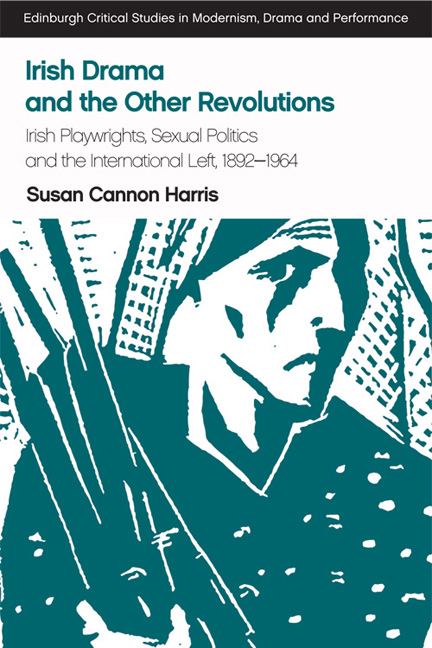 Irish Drama and the Other Revolutions
Irish Drama and the Other Revolutions Book contents
- Frontmatter
- Contents
- Acknowledgements
- Edinburgh Critical Studies in Modernism, Drama and Performance
- Introduction
- 1 Desiring Women: Irish Playwrights, New Women and Queer Socialism, 1892–1894
- 2 Arrested Development: Utopian Desires, Designs and Deferrals in Man and Superman and John Bull's Other Island
- 3 We'll Keep the Red Flag Flying Here: Syndicalism, Jim Larkin and Irish Masculinity at the Abbey Theatre, 1911–1919
- 4 Mobilising Maurya: J. M. Synge, Bertolt Brecht and the Revolutionary Mother
- 5 The Flaming Sunflower: The Soviet Union and Sean O'Casey's Post-Realism
- Epilogue: What The Irish Left – Sean O'Casey, Samuel Beckett and Lorraine Hansberry's The Sign in Sidney Brustein's Window
- Works Cited
- Index
Epilogue: What The Irish Left – Sean O'Casey, Samuel Beckett and Lorraine Hansberry's The Sign in Sidney Brustein's Window
Published online by Cambridge University Press: 06 January 2018
- Frontmatter
- Contents
- Acknowledgements
- Edinburgh Critical Studies in Modernism, Drama and Performance
- Introduction
- 1 Desiring Women: Irish Playwrights, New Women and Queer Socialism, 1892–1894
- 2 Arrested Development: Utopian Desires, Designs and Deferrals in Man and Superman and John Bull's Other Island
- 3 We'll Keep the Red Flag Flying Here: Syndicalism, Jim Larkin and Irish Masculinity at the Abbey Theatre, 1911–1919
- 4 Mobilising Maurya: J. M. Synge, Bertolt Brecht and the Revolutionary Mother
- 5 The Flaming Sunflower: The Soviet Union and Sean O'Casey's Post-Realism
- Epilogue: What The Irish Left – Sean O'Casey, Samuel Beckett and Lorraine Hansberry's The Sign in Sidney Brustein's Window
- Works Cited
- Index
Summary
VALEDICTION
In reconstituting the networks, exchanges and interactions through which these Irish playwrights participated in the international socialist and sexual revolutions, my hope is not so much that the individual plays examined here will come back to life but that the work of rediscovering their context will reorient and deepen our understanding of modern theatre. The work of restoring the water in which these strange fish once swam was undertaken in hopes that it would lead us to look for other texts or readings that might be, as it were, moving in the deep. As an example of how understanding the ever-complicating afterlives of idealism, queer socialism, radical eros, utopian dreaming, revolutionary mothers and metatheatre might enlarge our understanding of twentieth-century theatre, I want to close with a brief consideration of the impact of the Irish left on American drama during the Cold War. I offer this epilogue, not as a last word, but as a gesture towards a hoped-for future, in which the history of Irish drama and these other revolutions might illuminate other plays, performances and histories.
In the spring of 1956, two Irish playwrights offered the spectators of New York City two dramatically different visions of the human condition. Sean O'Casey's third attempt at a Lockout play, Red Roses For Me, opened on Broadway at the Booth Theatre on 8 December 1955. That April, after a disastrous few weeks in Miami, Michael Myerberg's revamped production of Beckett's Waiting for Godot reached Broadway. Having learned the hard way not to market Godot as popular entertainment, Myerberg presented Beckett's work as a challenge to New York's ‘playgoing intellectuals’, daring them to appreciate a play whose dramatisation of the meaninglessness of human existence had been endorsed by the intellectuals of France, England and the USA (Gelb, ‘Wanted: Intellects’, 177). Brooks Atkinson grasped Godot's ‘melancholy truths about the hopeless destiny of the human race’ and grudgingly admitted that the play made an impression on him (Atkinson, ‘Theatre’). Nevertheless, analogising Beckett's mysteries to those of the inscrutable Soviet Union itself, he subtitled his review of it ‘Mystery Wrapped in Enigma at Golden’. Red Roses For Me, meanwhile, Atkinson hailed as ‘O'Casey's Beautiful Ode to the Glory of Life’ (Atkinson, Sean O'Casey, 95).
- Type
- Chapter
- Information
- Irish Drama and the Other RevolutionsPlaywrights, Sexual Politics and the International Left, 1892–1964, pp. 213 - 240Publisher: Edinburgh University PressPrint publication year: 2017
